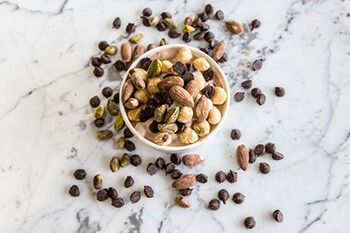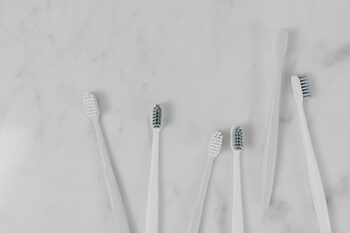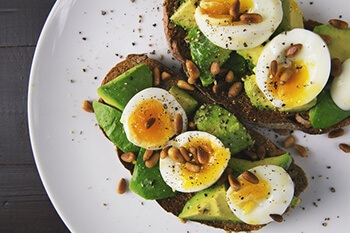Did you know that your genes have only a 10 percent influence on how long you live? Most experts agree that it’s the choices you make in your life that are the most important factors in your health and longevity.
In the early 1900s, the average life lasted 31 years. That’s hard to imagine today when the average lifespan is about triple that. But if you’re looking to live longer than our average, there are things you can do.
This doesn’t mean having to stop everything and changing it all. That’s not realistic. The idea is to be mindful and make some small, manageable changes. It’s the little things you do every day that makes a big impact in the end.
So let’s go through the simple things you can start doing today that will literally add years to your life. And remember, today is the first day of the rest of your life!
1. Be conscientious
Research has found that being conscientious is one of the best predictors of longevity. That's because people who are conscientious may be more likely to abide by healthful behaviours, may be less prone to disease, and may find more success in relationships and in the workplace.
2. Find reasons to laugh

In one study, researchers identified certain personality characteristics that a group of 243 centenarians – or people who live past 100 – had in common. Among them was a love of laughter. They considered laughter an important part of life.
3. Find a life purpose
In Nicoya, Costa Rica, where an overwhelming majority live past 100, residents cultivate a plan de vida, which means “reason to live. This sense of purpose often centres around spending time with and providing for their family and often results in centenarians retaining an active lifestyle, reaping the benefits of physical activity and exposure to the sun.
4. Go nuts

Eating nuts could keep you from dying early, according to a recent study. The study, based on data from 7,000 people ages 55 to 90, showed that nut-eaters -- who in the study were more likely to have a lower body mass index and waist circumference -- had a 39 percent lower risk of early death, and walnut-eaters, in particular, had a 45 percent lower risk of early death.
5. Walk a lot

123-year-old Carmelo Flores Laura, potentially the oldest living person documented, says he owes his longevity to regular exercise. "I walk a lot, that's all. I go out with the animals," he was reported saying in an interview.
6. Try a little retail therapy

Who doesn't love an excuse to go shopping?! A 2011 study found that frequent shoppers live longer.
The study looked at men and women over 65 and found that daily shopping lowered the risk of death by 28 percent for men and 23 percent for women. And if you're worried about the state of your wallet, you're in luck: The benefits hold up even if you don't buy anything.
7. Be happy
A recent study found that among older people, the group that scored as “happiest” had a death rate of 3.6 percent -- less than half the death rate of the unhappiest group, which was 7.3 percent.
8. Win an Oscar
Amusingly, a study has found that Oscar-winning actors and directors tend to live longer than their losing peers, with winning actors and actresses living nearly four years more than their losing peers. So you know what to do!
9. Head for the hills.

You may hear more often about the perils of altitude sickness, but it turns out that heading to new heights may be a good move. The 20 U.S. counties with the highest life expectancy had an average altitude of 5,967 feet above sea level.
That added 1.2 to 3.6 years to a man's life, and six months to 2.5 years to a woman's and lowered all residents' risk of dying from heart disease, according to research.
10. Do unto others
Susannah Mushatt Jones is the oldest resident of New York state – she celebrated her 114th birthday this past summer. What's her secret?
According to her niece, treating everybody fairly is one of her "standards," along with taking care of others. The only medication she takes is for high blood pressure, and her diet consists of ribs, chicken, fruits, and veggies.
11. But don’t forget about yourself
You need to remember to take care of the most important person in your life: you. Exercise and nutrition are what we need to live a prosperous life. Consider your choices carefully.
12. Put down the takeout menu

Here’s a reason to get cooking: research shows that people who cook at home up to five times a week were 47 percent more likely to still be alive after a decade. The researchers looked at 1,888 men and women over the age of 65.
13. Practice yoga

There are some exceptional benefits to hitting the mat, including stress and anxiety relief, better balance, and increased flexibility.
14. Be optimistic
The same study that pointed to enjoying laughter as a possible factor in longevity also found that optimism was a personality trait linked to longer lifespans. When the personalities of these 243 centenarians were assessed, researchers found qualities that reflected a positive attitude towards life.
Most were outgoing, optimistic, and easy-going.
15. But maybe not overly optimistic
Elderly people may not want to view everything through rose-coloured glasses: A new study shows that older people who overestimate their future happiness have a higher risk of death and disability, compared with people who underestimate or accurately predict future life satisfaction.
Pessimism about the future may encourage people to live more carefully, taking health and safety precautions when necessary.
16. Go meatless

Vegetarians may have a 12 percent lower risk of premature death than their meat-eating peers, according to a study published earlier this year. The study included more than 73,000 men and women who don’t eat meat for religious reasons.
17. Put a ring on it

Permanently partnered Baby Boomers are less likely to die early than their single peers, according to a Duke University Medical Center study. The findings were based on 4,800 people born in the 1940s.
18. And while you’re at it, marry someone younger
There are definitely benefits to having a younger partner when you’re old. They can help you to look after yourself and enjoy proper nutrition.
Of course, you probably shouldn’t actively look for someone who’s younger purely so that you can live longer.
19. Or marry someone of the same sex.

According to a Danish study, gay men who are married have a lower mortality rate than single or divorced straight men. The study looked at the mortality rate among gay men in Denmark after it implemented a same-sex partnership law in 1989.
20. Try to keep your marriage friction-free
A relationship full of turmoil and arguments could have an impact on how long you live. Researchers found in their study of 1,700 married adults that the more arguing there was in the relationship, the worse the adults' health.
21. But get divorced if it isn’t working
While a happy marriage is a good indicator of future health and longevity, all is not lost for the happily divorced – at least among women. Women who get divorced, often leaving a bad marriage, tend to thrive, as do single women.
In fact, even widowed women often do unexpectedly well. This was because women are able to rely on other friends, whereas many men depend on their wives for their social networks and so are devastated when they lose these ties.
22. Brush your teeth

Poor oral hygiene has been associated with shortened life expectancy. Maintaining a healthy mouth by habitually brushing and flossing can lower risks for heart disease, dementia, and stroke.
23. Enjoy a cup of Greek coffee
A daily cup of antioxidant- and polyphenol-rich Greek coffee could be the secret to living long, according to a study on men and women who live on the Greek island of Ikaria -- an island where residents tend to live to age 90 or more. It was found that those who drink boiled Greek coffee on a daily basis had better endothelial functioning than those who drank other kinds of coffee.
24. Ride a bike quickly

As with walking briskly (also in this list), the pace at which you pedal your bike might predict how long you'll live. One study found that men who pedaled fastest lived about five years longer than men who pedaled slowest.
The fastest female cyclists averaged about four extra years. Among both genders, average cyclists lived somewhat longer than the slow pedallers, proving the point that physical activity is good, but vigorous activity is even better.
25. Or be a super cyclist
Here’s another amusing study that perhaps not everyone will find useful! According to research, French cyclists in the Tour de France tend to live longer than their non-cycling peers.
Scientists compared the cyclists’ health and causes of death with other French men in the same age range who did not participate in the Tour de France, and found that their mortality rate was 41 percent lower, compared with the non-cyclists.
26. Enjoy a Mediterranean diet
Elderly people who eat a Mediterranean diet, rich in healthy fats (like olive oil), fish and produce, may have an increased lifespan, compared with their peers who don't follow the diet. The study showed that the chances of living longer increased by 20 percent from eating a Mediterranean diet.
27. Stop smoking

As if you needed another reason to quit the habit, research shows that giving up cigarettes could help women live 10 years longer than if they had continued smoking. The study included 1.3 million women whose health habits were analysed between 1996 and 2001.
28. Eat your fibre
Consuming lots of fibre, especially fibre from grains, could help stave off early death from heart disease, infections, and respiratory illness in men and women, as well as the risk of death from cancer for men, according to a huge recent study. The research showed that people who met dietary guidelines on fibre – 25 grams per day for women, and 38 grams per day for men – had a lower risk of dying over a nine-year period.
29. Have a family

Becoming a parent could help you live longer by decreasing your risk of conditions such as cancer and heart disease. However, there’s a catch – the study that found this information also discovered that the health benefit only seemed to extend to people who had just two children.
30. But wait a few years to get started
While it might be harder for them to get pregnant, research shows that women who have children in their 40s seem to be more likely to live to 100 than women who have children earlier in life. It won't be physically possible for all women -- and that's the point.
If a woman has not yet entered menopause in her 40s, she likely has the anti-aging genes required to make it to that 100th birthday.
31. Hope for a daughter (if you’re a dad!)

One interesting study found that having daughters may increase the lifespan of fathers. In fact, for every daughter born, the dads studied lived about 74 weeks longer.
32. Hope for twins (if you're a mum!)

Those who deliver a set of twins may enjoy a longer lifespan, according to a report that found that rather than being a reproductive accident that drains mom of energy and nutrients, twins could be an evolutionary adaption in which healthy moms take the chance to pass on double their genes at once.
33. Stay in school
People who stay in school for at least 12 years have more years of life ahead of them than those who don’t complete high school, so stick it out if you’re still at school age.
34. Make healthy changes in your life (starting today)

Adjusting your daily habits so that you eat whole foods, exercise, meditate and lean on your support system might potentially reverse cell aging. A recent study showed that making these healthy changes to your life is associated with longer telomeres, which are the "caps" at the ends of chromosomes.
Shorter telomeres have been linked in past research to cell aging, as well as higher risks of age-related diseases. While the study didn't show that healthy lifestyle changes can actually make you age backward, this is certainly positive news.
35. Don’t dread getting older
Turns out, your outlook on aging might play a role in the number of birthdays you celebrate. According to a recent study, adults who developed positive attitudes about getting older lived more than seven years longer than those who had negative attitudes.
Think of each candle as an accomplishment!
36. Go for the gold
As if they needed it, here's another reason for elite athletes to go for the gold: Olympic medallists live longer. It’s thought that those lucrative endorsement deals and access to top doctors might have something to do with it.
No, we can’t all work towards an Olympic medal, but it’s still pretty interesting.
37. Be Japanese
If you’ve ever wished you could change your country or origin, prepare to feel jealous of the Japanese. Apparently, people who are born in Japan have the longest average life expectancy, and girls born in Japan in 2012 can be expected to live to 86.41 on average.
38. Lay off the vitamins

While many health professionals advocate taking vitamins to help prevent deficiencies in vital nutrients, a review of 815 clinical trials found that taking supplements had a detrimental effect on lifespan. The studies investigated the health benefit of common supplements and found a relationship between taking some of these supplements and the risk of all-cause mortality.
A separate study also found that older women increased their risk of cardiovascular or cancer death by taking a daily vitamin – especially an iron supplement.
But ask your doctor before you ditch your daily dose, as those who take regular vitamins may have pre-existing conditions that affect longevity and have nothing to do, directly at least, with the pills themselves.
39. Take a cue from the Latino community
Researchers call it the “Hispanic paradox”: Despite lower average income, health insurance, education, and other measures of socioeconomic status, people who identify as Hispanic live an average of 2.5 years longer than the overall American average, according to government research. Researchers aren’t sure why, but one theory relates to the influence of traditional Latin American values, like family togetherness.
Many Latino community environments also discourage high-risk behaviours, such as excessive smoking, high alcohol consumption, and heavy use of mind-altering chemicals that may threaten lifespans.
40. Go to church

Attending weekly religious services can add an extra 1.8 to 3.1 years to your life expectancy, according to a recent review. This longevity benefit could lie in the church's stress-relieving benefits, though it's also possible that being in a religious community helps you make meaning out of your life.
41. Drink alcohol (But only in moderation!)

Drinking just one or two glasses of alcohol a day could help middle-aged and older adults live longer – but, of course, it's all about moderation, as heavy drinkers have a 42 percent increased mortality risk. Older people drinking alcohol should remember that consuming more than two drinks a day exceeds recommended alcohol consumption guidelines and is associated with increased falls, a higher risk of alcohol use problems, and potential adverse interactions with medications.
42. Up your omega-3 intake
Consuming lots of omega-3 fatty acids, which are found in fish, as well as some vegetables and seeds, could boost your longevity. Older people with the highest levels of omega-3s in their blood have been found to have longer lifespans by 2.2 years (on average) than those with low omega-3 blood levels.
43. Help someone else
Volunteers may live longer than people who don't give of their time, according to one study. However, there's one catch: the volunteering has to be done for the purpose of helping others, versus helping yourself.
44. Take off

In case you’re feeling particularly guilty about taking your vacation days, consider this: An analysis of a study showed that the more frequently men took vacations, the longer they lived.
45. Get busy in the bedroom
Spending a little extra time between the sheets may add years to your life. A study of more than 1,000 middle-aged men showed that having sex once a month or less is linked with a 45 percent higher risk of heart disease than having sex two to three times a week.
And women who enjoy sex may live up to eight years longer than women who don't.
46. Get enough sleep

It's time to start taking your sleeping habits seriously. People who don't get enough sleep die younger of any cause than people who get sufficient shuteye.
In one study, men who got fewer than six hours of sleep a night were four times more likely to die over a 14-year period.
47. But not too much sleep
You don't want to cut your sleep short, but you don't want to overdo it, either. A number of studies suggest that more than nine hours of sleep can increase your risk for a number of serious health conditions, as well as an earlier death.
One study found that long sleepers faced a 30 percent higher chance of premature death than people who slept around seven to eight hours a night.
48. Get a pet

If you need another reason to get a pet, besides unlimited adorableness and unconditional love, consider this: Research shows that both cat- and dog-owners tend to live longer than their petless peers. One study found that owning a cat could cut your risk for heart attack by nearly one third.
Another discovered dog-owners (and even just dog-petters) cope better with depression and certain stress-related disorders.
49. Join the 1 percent
Yes, rich people really do live longer. Research shows that a padded bank account is strongly correlated to longer life expectancy, thanks to a host of factors that include better access to education, which is associated with longevity in its own right; access to health care; and lower risk of violent crime.
What’s more, some researchers suggest that health creates wealth: Those who are well can work, accumulating resources that, in turn, keep them healthy.
50. Eat broccoli

If you hate broccoli, you’re not going to be happy to hear this: one study found that those who munched on plants from the mustard family -- like broccoli, cauliflower, and cabbage -- tend to live longer lives. Researchers suggest this may be tied to the high vitamin C and nutrient count in these kinds of veggies.

51. Run, but not too much
Turns out there really can be too much of a good thing. A moderate jogging habit can add between five and six years to your life, according to an analysis of study data.
But additional research has found that people who run more than 20 miles a week, faster than 7 miles an hour, or more than five times a week seem to lose the longevity boost.
52. Wash your hands

It sounds silly, but as we all know today, washing your hands could save your life. One study estimates that handwashing could save more lives worldwide than any vaccine or other medical intervention.
53. Drink your coffee – but in moderation
There's a lot good about your cup of coffee: it’s high in antioxidants, it could decrease your risk for diabetes and it's even linked to lower depression risk in women. And yet, it might be best to keep your cup count under four, as one study found that those who drank an average of more than four cups of coffee a day were at a 21 percent higher risk for death than those who sipped more moderately.
54. Make friends at the office

Making friends at work is good for more than productivity. Research on 820 adults over 20 years found that the people with the most social support from co-workers lived the longest.
The lone wolves with no friends in the office were 2.4 times more likely to die during the study.
55. Be a woman
Sorry, men, but this benefit doesn’t apply to you: Women live an average of five to 10 years longer than men in industrialized countries. And 85 percent of centenarians – that’s those who live past 100m, just to remind you – are female.
There's little conclusive evidence as to why, however. A recent study suggested it may be because women have more robust immune systems. Other theories have ranged from men experiencing more work stress to women choosing healthier nutrition habits.
56. Grow from trauma
In an astounding display of resiliency, a study showed that male Holocaust survivors lived longer than men of the same age group who immigrated to Israel before Nazi rule. This finding could be a display of post-traumatic growth, leading these men to greater meaning and satisfaction in their later lives.
57. Keep busy
While many of us look forward to retiring, the best way to enjoy your golden years may be to keep working. Among the men who were subjects of the famous Longevity Project, those who made it into old, old age had successful, satisfying careers and continued to work – at least on a part-time basis – into their 70s.
58. Don’t sit down for too long

By now, we all know that sitting all day is damaging our health, and according to one study, it could even affect your lifespan. Apparently, sitting for fewer than three hours per day could add two years to your life.
59. Cultivate your green thumb

Almost all of the famed centenarians in Okinawa share the same hobby: they grow (or once grew) gardens. Not only is gardening a calming, low-impact physical activity, it can also provide a steady stream of homegrown fresh produce.
60. Walk faster
Do you have a friend or family member you just can’t keep up with? Or are you that person Natural speed walkers have an edge, with the fastest walkers living the longest, according to a study of over 34,000 older adults.
Unfortunately, powering up your next walk around the block won't exactly add candles to your birthday cake. It appears to be your natural walking speed that predicts lifespan and not something you have much control over.
61. Smile

It's not just that optimistic spirit that keeps you going. The actual size of your smile might make a difference. In one slightly random study, researchers examined smile intensity among a series of photos of baseball players from the 1950s.
They found that those with no smile in their picture lived an average of 72.9 years. The biggest smilers, on the other hand, lived 79.9 years.
62. Hit the gym

If this doesn't convince you that you need to exercise, nothing will: Meeting or exceeding the World Health Organization's recommendation to get 150 minutes of moderate exercise a week can add about four years to your life, compared to never exercising. Even just getting half the recommended amount of gym time can tack on about two extra years.
63. Take it easy on processed meats
It’s obvious that nutrition plays a big role in longevity, but it isn’t just what you eat -- it’s also what you don’t eat. While you're busy adding omega 3s and antioxidant-rich produce, you might want to consider cutting back in one area: processed meats.
A recent study linked a diet heavy in processed meats, like sausage and bacon, to a higher risk of dying from cancer and heart disease.
64. Stay away from professional football

Slowly but surely, science is helping us unravel the true dangers of playing professional football. Among this growing body of research is a study that found that professional football players are four times more likely to die of Alzheimer's disease or amyotrophic lateral sclerosis, a progressive neurodegenerative disease that affects nerve cells in the brain and the spinal cord.
65. Have a little extra (but steer clear of obesity!)
In research that defies the conventional wisdom, overweight people are less likely to die from any cause than normal, underweight, and obese people. Researchers found that having a BMI between 25 and 29.9, a measure that describes 30 percent of the U.S. population, was associated with longer life.
We’d take this one with a pinch of salt – it’s not an excuse to get that fourth helping at the buffet!
66. Take the stairs

Do yourself a favour and opt for the stairs, not the lift. Research has found that among people with a sedentary lifestyle, simply taking the stairs amounted to enough physical activity to burn body fat and lower blood pressure, cutting their risk of early death by 15 percent.
67. Get a Nobel Prize
Much like Olympians and Oscar winners, the learned men and women who win the Nobel Prize have a leg up, longevity-wise, on the rest of us. They even have a leg-up on Nobel finalists who do not win the actual prize, living one or two years longer, on average, than the runners-up.
One theory may be that Nobel Laureates have a perceived higher social standing than those who do not win. The higher a person’s social standing, the lower his or her stress, suggests this theory.
And that has a real advantage when it comes to longevity. So, if you’re not an Olympian or a world-renown actor or actress, you still have options!
68. Slow your resting heart rate

A fast heart rate may be a sign that you’ll meet an earlier end. Researchers discovered that a key predictor of long life in otherwise-healthy middle-aged and elderly men was resting heart rate – regardless of fitness level or other health behaviours.
69. Win the genetic lottery
You can do everything right when it comes to your future health and long life, but certain factors that relate to longevity are in your genes. Mothers, in particular, play an important role in determining lifespan by passing on genetic mutations that relate to the aging process.
70. Believe in your own good health
Researchers often ask elderly patients to rate their own health. Those who report feeling crummy actually have a higher risk of death than those who self-assessed as “excellent,” “good” or “fair.”
While much of that is likely because these people accurately assessed that they were unwell, it certainly doesn’t hurt to have a positive outlook.
71. Don’t rush to start school
Most school districts dictate when a child is ready to get started, but in certain cases, parents will push or delay their son or daughter's first day in nursery or reception class. But according to one study, starting first grade before age six is linked to earlier mortality.
72. Think about... death

It sounds counter-intuitive, but contemplating your mortality may actually help you live a longer life. Apparently, being self-aware about our inevitable passing impacts our compassion for others.
Even more, studies have shown that when we're reminded of death, we're more likely to make better decisions about our own health, like using sunscreen, smoking less, and exercising more.
73. Turn off the TV

Here's a frightening factoid: Every hour of TV you watch after age 25 cuts your lifespan by about 22 minutes. Research also found that people who average six hours a day in front of the TV died nearly five years sooner than people who didn't watch any TV at all.
74. Stay informed
Too much TV is a bad idea, but consuming mass media, like TV, newspapers, and the internet, in search of information is a saving grace. Researchers followed the news-gathering habits of more than 1,100 adults and found that people with the most media exposure were also the healthiest eaters. And of course, we all know that we are what we eat.
75. Cut the sugar

Got a sweet tooth? It’ll cost you. Sugar might taste good to you, but processed sugars aren't good for you.
Eating a lot of refined, added sugars can lead to headaches, low energy levels, and inflammation. Sugar increases our risk of developing metabolic disorders, such as obesity and diabetes, and can shorten our life expectancy by several years.
76. Choose your job wisely
If you’re planning on a long life and you have the freedom of choice, you may want to avoid some of the deadliest occupations. Electricians, painters, miners, civil engineers, lorry drivers, and factory workers are all more likely to suffer a fatal injury at work.
77. Eat an Andean diet
Bolivian farmer Carmelo Flores made headlines when he attributed his 123 years to a traditional Andean diet of superfoods, like quinoa, mushrooms, and coca. But it seems it isn’t the individual foods that likely contributed to Flores’ long life – it is simply the absence of modern, processed foods.
So eating superfoods every now and then won’t do the trick, unfortunately.
78. Move to Hawaii

If you have secret dreams of moving to Hawaii, you now have a solid reason to do so. In addition to being the happiest and least-stressed state in the country, Hawaii also boasts greater longevity than any other U.S. state.
A 65-year-old in Hawaii will go on to live another 16.2 years on average, as compared to another 10.6 years in Mississippi, the American state with the lowest longevity rankings, according to recent data.
79. Or choose the Dakota
While Hawaii might have the greatest life expectancy among the 65-and-older set, North Dakota has the highest rate of centenarians per capita, followed closely by South Dakota. The effect of your locale on your longevity is likely due to a combination of socioeconomic factors, although no one is certain why the Dakotas have such a long-lived population.
80. In the face of bad health, keep a positive attitude
It's all about looking on the bright side! A recent study showed that heart disease patients who keep positive attitudes are more likely to exercise and live longer than their less positive peers.
The findings suggest that we should focus not only on increasing positive attitude but also make sure that we perform an exercise on a regular basis, as exercise is associated with both increased levels of optimism and better health.
81. Eat less

Women from Okinawa, Japan, enjoy the longest disability-free life of any population on Earth – and the rest of the world has been looking to the population for its longevity secrets. One is the Okinawan habit of beginning meals with the phrase, “Hara hachi bu,” which means, “Eat until you are 80 percent full”.
Restricting calories and never overeating is one reason that the Okinawan population has such a large concentration of centenarians.
82. Get up when you fall
Psychological resilience – that is, the ability to effectively cope with life’s challenges rather than being beaten down by them – has been linked with increased well-being and longevity. Research into the psychology of aging shows that psychologically resilient adults cope well with an aging body.
When they lose friends or loved ones they express their feelings in an open, healthy way.
83. Get a mammogram
Women face a higher risk of death when cancer isn’t detected early. One study found that women diagnosed with breast cancer in their 40s who died from the disease were more likely to have never had a mammogram than older women. So schedule those mammograms if this applies to you.
84. Have a happy childhood

Okay, so this isn’t something that any of us can control, but experiencing a traumatic incident n as a child could actually make you more likely to die early. Women in particular who experienced a traumatic event before reaching age 16 had a 66 percent higher chance of dying before reaching age 50.
85. Live a spiritual life
In a survey of centenarians, 84 percent say that staying in touch with their spirituality is “very important” for healthy aging. Whether it’s being part of a faith-based community or maintaining your own meditation practice, finding what spirituality means to you could help you enjoy more of your golden years.
86. Find the healthy hobbies that make you light up

Finding respite in simple, productive activities, like gardening and completing crossword puzzles, can help to relieve stress and provide a sense of accomplishment, both of which can contribute to a long, happy life.
87. Practice positive self-talk
Positive affirmations can help you to believe in yourself and see the world in a happier light. We already know that happiness can help you to live longer, and one study found that older people were up to 35% less likely to die if they reported feeling happy, excited, and content on a typical day.
88. Be a city-dweller
Interesting findings show that those who live in urban areas tend to live longer and healthier than their rural counterparts. That's because of higher rates of cigarette use, obesity, and chronic health conditions, such as diabetes and hypertension, among people who live in rural areas.
89. But living in the country can be good, too (if you're British)
The U.K.'s Office for National Statistics reported that rural residents in Britain live longer than their city-dwelling peers – two more years for men, and one-and-a-half more years for women. Plus, the countryside seemed to be associated with a closing of the life expectancy gap between rich and poor.
90. Take a midday snooze.

Regular siestas, combined with genetics and consuming healthy produce- and fish-heavy diet, could be the key to living longer if the residents of Ikaria island are any indication. An estimated 10 times as many residents on Ikaria are older than 90, compared with the rest of Europe.
91. Dazzle with your good looks
Recent research shows an interesting association between attractiveness and longevity. Researchers found that people who scored higher in attractiveness lived longer – to 76, on average than their less-attractive counterparts, who lived on average to 69.
92. Breastfeed your baby

Women who breastfeed their babies could lower their own chances of death from cancer, heart disease, and other conditions. The risk of dying from heart disease is 8 percent lower and the risk of dying from cancer or other diseases is together 17 percent lower for women who breastfeed exclusively for at least six months.
Longer breastfeeding means fewer menstrual cycles and reduced lifetime exposure to the hormonal factors, especially estrogenic, that influence breast cancer risk. Physical changes in breast tissue that accompany milk production provide some protection as well.
93. Stay active
15 minutes of daily exercise is the bare minimum for health, and just 15 minutes of exercise a day can boost life expectancy by three years, and cut death risk by 14 percent. So you don’t need to run marathons if it’s not for you – but make sure you’re doing something every day.
94. Swim regularly

Swimming may be the sport to beat when it comes to longevity. One study showed that compared with running, walking, or being sedentary, swimming cuts death risk for men by 50 percent.
95. Stay occupied
To add to point number 93, your ability to move and get around is a good indicator of healthy aging. Increased physical activity and exercise are extremely important for healthy aging.
96. Use your brain
Another long-life secret of the Okinawans is keeping their brains actively engaged with games and intellectual stimulation. One survey found that 89 percent of centenarians keep their minds active.
97. Finish college, then further education
An education enriches your life -- and it may help to make it longer. Earning a bachelor's degree or higher has been associated with nine additional years of life, compared to earning only a high school diploma.
Highly educated people tend to have healthier behaviours, avoid unhealthy ones, and have more access to medical care when they need it.
98. Be creative.

Recent research suggests that creative types may enjoy a longer life. Those who had the highest measure of creativity reduced their mortality risk by 12 percent.
99. Don’t go to bed angry
We’ve all done it – had a fight with our spouse and gone to bed angry, letting the thoughts ruminate while trying to doze off. A word of advice: don’t do it.
In one study, researchers found that with 1,700 married adults, the more arguing there was in the relationship, the worse the adults’ health.
Conclusion
As you now know, there is no secret hack to living longer that only centenarians know about! You just need to implement a few basic changes to your lifestyle, diet, and mental outlook to get to your 100th birthday.
If we missed any tips out that worked for a friend or relative of yours, or even for yourself, be sure to let us know in the comments below.

